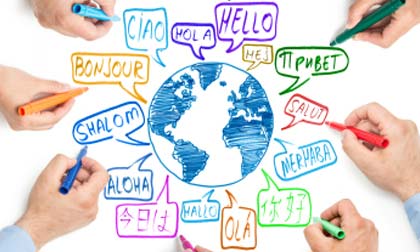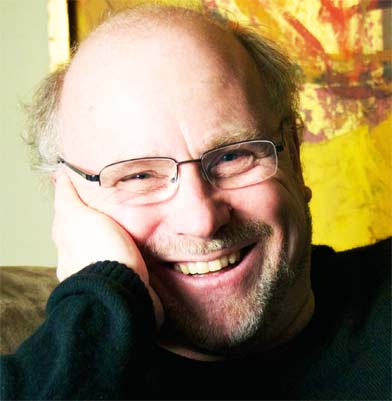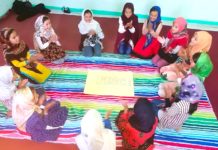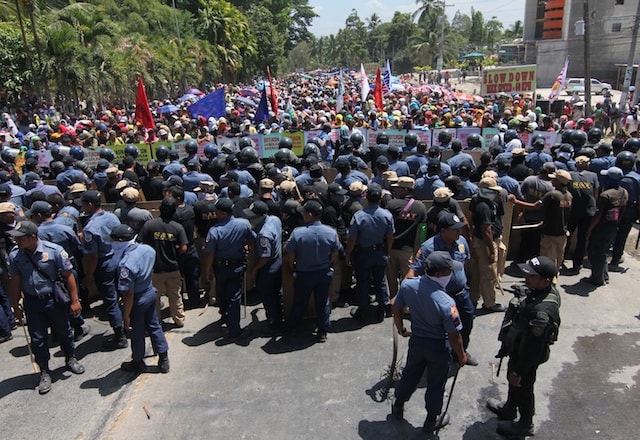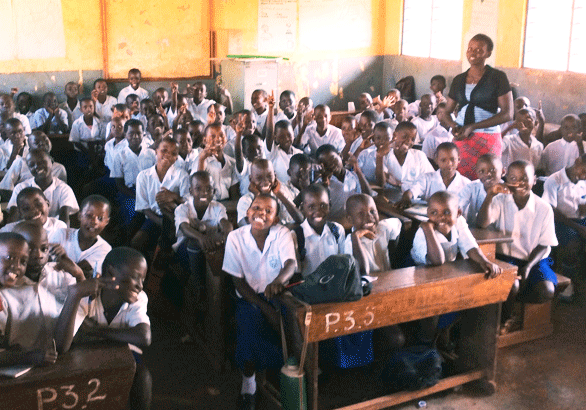By MIKE LEVIN
By summer’s end in 2014, an outbreak of the Ebola virus in West Africa had turned into a full-scale epidemic, and Firdaus Kharas was frantically trying to find ways to translate his animated Ebola-prevention video into enough languages to be understood in every village in the stricken areas.
That’s when he contacted Translators Without Borders (TWB), a humanitarian non-profit that offers free-of-charge translation in crisis situations as well as in day-to-day work for some of the world’s most-effective humanitarian organizations like Médicines Sans Frontières, UNICEF and OXFAM.
“They took on Herculean tasks of translating the script, finding a young voice, recording the talent and sending me the audio files in each language. Their tenacity ensured the video reached many people in their native language. They contributed to the saving of lives,” Kharas says of Ebola: A Poem For The Living, his short, emotional story of a young boy’s death and the pleas of prevention he passes to his family.
- Translators Without Borders (TWB) is a humanitarian non-profit that offers free-of-charge translation in crisis situations as well as in day-to-day work for some of the world’s most reknowned humanitarian organizations.
- Thicke’s Website tells a story of a homeless Czech man in Canada who couldn’t read English and therefore couldn’t understand how to live in charitable housing. TWB translated the documents and helped him find a home.
- As of 2015, TWB is translating 800,000 words a month for 160 humanitarian organizations. Except for a small paid team in Nairobi, all work is done by volunteers. The demand is growing fast, which makes one wonder why it took so long for a global translation NGO to arrive.
TWB Global Co-ordinator Grace Tang was the one to take up the challenge. Within weeks she arranged for the video’s voiceover to be dubbed into five more languages (Bambara, Swahili, Fula, Mende and Themne). By early November the video could be understood by 400 million Africans and as much as 80 percent of those in the Ebola zones. It has been watched more than 500,000 times online and has already won multiple awards.
Tang co-ordinated the effort from Nairobi. She says the logistics were difficult but the commitment was instantaneous. “Our volunteer translators have a deep connection to the region and the people of the language(s). They are from there, and those who speak the same language natively, have a connection.”
As people become aware of TWB’s services, emotional moments have arrived more and more frequently.
Program Director Rebecca Petras’ voice cracks as she tells the story of how two children were rescued during Typhoon Haiyan in the Philippines during November 2013. Someone had been able to get a note in Tagalog to an English-speaking helicopter pilot. A TWB translator was immediately able to translate it and guide the pilot to the rescue spot.
“Every time I hear that story, I’m so proud to be a part of this organization,” Petras says from her current home in Moscow. The message is clear: if information isn’t delivered in the language of the intended audience, the results can be of no value, or worse.
It is the simplest and most effective of human connections – the transfer of knowledge, yet its importance in humanitarian scenarios is, surprisingly, only recently becoming understood.
Lori Thicke saw the need and in 1993 founded Traducteurs Sans Frontieres, a pro-bono translation service for NGOs, non-profits and social enterprises. But it couldn’t scale so in 2010 she incorporated it in the United States under the English name Translators Without Borders. With the move came expanded funding and exposure.
Its role was to offer translations in a sustainable, often daily, environment. But when an earthquake devastated large parts of Haiti earlier in 2010, Thicke knew TWB had a far broader role.
“It was the impetus for me personally to go out and put together a board to help me scale the new (organization). Haiti was a completely different scale. It showed us how much need there was. For the first time we had the technology to reach and listen to people,” says Thicke.
Within days of the earthquake TWB started receiving 1,000 applications a week from translators wanting to help. Similar responses came during subsequent crises in the Philippines, China, India, Syria, the Ukraine and West Africa, among many others. The results are so successful that the organization is piloting a crisis-relief network in Nairobi called Words of Relief.
Its goal is to link communities and relief workers in any local language or dialect by monitoring and translating key messages from a crisis zone and then disseminating information to those who most need it. This requires spider networks of rapid-response translators that can use digital platforms (mostly mobile) to aggregate information and other data. The platform also allows for crowd-sourced information that can make responses far more efficient.
This is not as difficult as it may sound because the penetration of mobile phones throughout much of the developing world is between 50 and 70 percent of the population. Digital platforms are the only realistic way to achieve its goals because there are no resources to have physical teams on-site.
Only about five percent of incoming communications monitored by TWB are unique and vital so the key factors are analysis and timing.
In an emergency scenario, TWB contacts five translators in its network who can work in a specific language. If no one responds within 15 minutes, then the next five are contacted.
Only a small portion of TWB’s work is done in the high-stress weeks after a crisis. The rest is nuts-and-bolts translations that eliminate linguistic barriers to humanitarian information. Diasporic volunteers have never been a problem to recruit.
It can be as basic as translating Wikipedia entries or user manuals so that billions of people have equitable access. There’s also a component that links the United Nations Refugee Agency to refugees. Thicke’s Website tells a story of a homeless Czech man in Canada who couldn’t read English and therefore couldn’t understand how to live in charitable housing. TWB translated the documents and helped him find a home.
The organization co-ordinates this work through a digital exchange called Workspace that links users and translators, and the most valuable aspect lies in health care. For those without access in their own language, the consequences of not being able to read basic medical instructions can be catastrophic.
There are hundreds of stories about people in developing countries who are given medicine to help with infection or maternal issues only to misuse the drug because they can’t read the instructions, which tend only to be in major European languages. Deaths are all-too common because of this failing.
Some will never be able to see a doctor at all, so translated leaflets or posters in public spaces take on an importance that most people in developed countries can’t understand. The problem is most evident during outbreaks of preventable diseases like malaria, cholera, HIV/AIDS, Ebola and many others.
A company like Ireland’s iheed does great work moving basic healthcare training into mobile-delivered modules, but it isn’t widely multilingual. So a frontline healthcare worker in rural Africa or Asia may be able to access information on infection but can’t understand or communicate it. It’s bitterly ironic that a language barrier rather than a technology barrier is the biggest problem.
As of 2015, TWB is translating 800,000 words a month for 160 humanitarian organizations. Except for a small paid team in Nairobi, all work is done by volunteers. The demand is growing fast, which makes one wonder why it took so long for a global translation NGO to arrive.
“We have found the concept of communications to be a relatively new piece of the (development) puzzle,” says TWB’s Petras. “The (big humanitarian outfits) have lived in a world where they believe English and French are enough.”
This political component is easy to ignore in do-gooder environments. European (colonial) languages have always carried the communications of elites in power. It has become so inflexibly entrenched that those working in-country don’t want to ask the structures that fund them about why this has never changed.
Also, translators must be cultural intermediaries, which requires an intimate focus on how relief recipients think and feel. Accurate translation requires an ability to believe each individual is unique, and no one has the financial resources to make this path work effectively.
It is no surprise that during the continuing Ebola epidemic in West Africa, when healthcare professionals told villagers they have to give up their tradition of touching and bathing a body before burial (one of the disease’s main infection vectors), widespread distrust arose. The attitude was supported by virtually all the official messaging being in English.
“Language is very political. We steer away from that,” Petras says. But she understands a connection is unavoidable and uses the 2013 election in Kenya as an example.
“In the (2007 election), groups that benefit from chaos used misinformation in tribal languages (to affect the election’s outcome),” she adds.
The United Nations noted that the 2007 election was widely marred by corruption and violence. This spawned an Africa-based digital platform called Ushahidi that crowd-sourced trouble spots and relayed them to others. TWB and Ushaidi found a natural fit, and in 2013 TWB became heavily involved in the election, where a record number of voters turned out.
Ten translators filled in around the clock under project manager Paul Warambo in Nairobi. “I am a Kenyan and a voter at the time, I had the memories of the deadly violence of the 2007/8. I feared just like any other Kenyan that chaos would have erupted if the situation was not well handled,” he says.
When the data system collating votes from around the country broke down, there was huge potential for manipulation and more election chaos. The biggest problem was communicating accurate information to and from districts far from Nairobi, which meant using 11 different Kenyan languages. During eight days TWB volunteers worked 24 hours a day ensuring that no one was misunderstood. This included hundreds of conversations and emails and 38,000 SMS texts.
The election is considered the calmest and most-fair in the country’s recent history.
TWB and Ushahidi teamed up again for the March 2015 election in Nigeria. “Our goal is to make sure every voice counts,” Petras says.
That’s a tough taskl when, until now, making every human understood has never had a high priority within large humanitarian organizations in development aid and crisis management. That’s the thing about translation; like a shovel in the desert, we never think about it until we really need it.
Last year TWB brought together 111 language pairs and used 3,000 volunteer translators who donated 33,000 hours of their time. These numbers are impressive but not the balance-sheet deliverables that the world seems obsessed with. Not the kind funders can take to their Boards of Directors to show lives saved or catastrophes avoided.
Firdaus Kharas understands the situation well. His four public-service-announcement campaigns aimed at the developing world in multiple languages are often ignored in the Western world because the effects are so hard to measure. Yet with mainstream projects rarely getting metrics worth bragging about, things may soon change.
“We are now at a new point of human history: an age of global, instant, widespread, personal, two-way communications. In order to succeed, vital content that travels in this new age must be understood by the recipients. One of the principal barriers we have as a species is the myriad of languages that exist. We must overcome that barrier in order to make this world a better place,” he says.
This is where Lori Thicke, Rebecca Petras, Grace Tang and thousands of volunteers are trying to direct Translators Without Borders in the future. In a globalized world with billions of people trying to talk to and understand each other, technology never goes as far as the all-too-human elements of translation.
(Mike Levin has been a journalist for 35 years. He has lived and worked in Tokyo, Hong Kong, Los Angeles and his native Ottawa writing about economics, business, the environment, humanitarian efforts and the music industry among many other subjects.)


